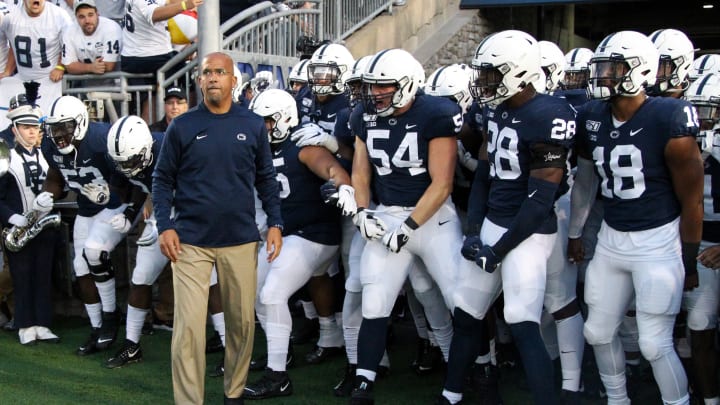'We're All Going to Make Some Sacrifices'

Illinois linebacker Milo Eifler asked the question that looms over college football, over even college itself, this summer, the one with which more student-athletes will struggle as training camps approach.
As college athletes return to campus for voluntary workouts, get tested for COVID-19 and in Kansas see those workouts shut down, the conversation is intensifying about whether to pause the upcoming season.
A hearing in Washington D.C. last week about compensating athletes detoured with questions regarding how colleges have handled testing. Suggestions to delay the football until spring are amplifying again, and Sports Illustrated's Rohan Nadkarni wrote that college athletes need to unionize.
At Penn State, Athletic Director Sandy Barbour said last week that the department had tested 102 student-athletes with no positive results. Penn State will announce its next set of testing results July 15.
But, as Barbour was asked, where does college football cross a line in asking players to play through risk?
"If we are coming dangerously close to crossing any line that endangers students, coaches, staff and our community, we're not crossing it," Barbour said.
But absent a vaccine, and presuming a safe way forward medically, student-athletes will have decisions to make, which could come down to their comfort level with assuming risk.
Like many coaches, Penn State's James Franklin asks his players to follow a system of core values. Among those he emphasizes most is "sacrifice."
Several Penn State players have discussed the sacrifices they expect to make in order to play football this season. Those extend further than wearing masks to work out and getting their temperatures taken.
In order to play, players might have to quarantine themselves even more from the college experience, cutting themselves off from family and friends, leaving campus and perhaps even attending in-person classes.
"We're all going to make some sacrifices, but I think as a team we're all prepared to do that and move forward," Penn State sophomore cornerback Keaton Ellis said.
Barbour said that Penn State is asking student-athletes and staff to sign a "One Team Pledge" affirming that they will adhere to basic health and safety protocols. The university will ask students returning in August to sign a similar pledge. Barbour said it's not a waiver required to participate in sports.
Franklin said last week that six scholarship players had not returned for voluntary workouts, which run through July 12. Barbour said she knew of a "small number' of athletes who have chosen not to return yet, not all of whom made their decision for coronavirus-related reasons.
Some, Barbour said, might not be comfortable with restrictions placed on athletes during voluntary workouts.
"We are highly discouraging that they leave [campus] because, if and when they return, they have to be re-tested and re-quarantined," she said.
Athletes who ultimately choose not to play because of concerns about COVID-19 will remain on scholarship, Barbour said. If student-athletes contract the disease, Barbour said that Penn State's policy is to treat them "for whatever their conditions are."
She was less clear about potential treatments for the long-term effects of COVID-19.
"Obviously we have zero understanding, or very little understanding, of what any long-term impacts of what COVID-19 might be," Barbour said. "And that's frankly one of the more concerning things we're starting to read about and hear about in the conversations."
State College will remain relatively quiet until August, when most students are scheduled to return. That will complicate sports even further, considering its difficult to ask student-athletes not to be college students.
Penn State is asking students to be disciplined about group gatherings and off-campus travel. Athletes will have to be even more disciplined, a fact of which Barbour is keenly aware.
"Our students operate in an age group and in a culture where it is all about connection and engagement, and we're asking them to stop doing that," she said.
One of Franklin's favorite sayings involves 18-22-year-old males being the "most unpredictable group of people on the planet." How will his players respond to the extra restrictions of playing through a pandemic season, if it happens?
So far, they're taking cues from their coach.
"Sacrifice: that's one of our core values," receiver Jahan Dotson said. "That just goes along with life. I'm ready to adapt to whatever environment I have to.
"... When we leave the [football] facility, we won't be able to watch every single person, so guys are going to have to be accountable for themselves, knowing that they're at risk anytime they're in public with other people. We're going to have to be cautious with things like that. We're going to have to see the bigger picture in all of this and know that we have something going for ourselves that we need to always keep in the back of our minds when we're thinking about going out and stuff like that."
Get the latest Penn State news by joining the community. Click "Follow" at the top right of our AllPennState page. Mobile users click the notification bell. And please follow AllPennState on Twitter @MarkWogenrich.

Mark Wogenrich is the editor and publisher of Penn State on SI, the site for Nittany Lions sports on the Sports Illustrated network. He has covered Penn State sports for more than two decades across three coaching staffs, three Rose Bowls and one College Football Playoff appearance.